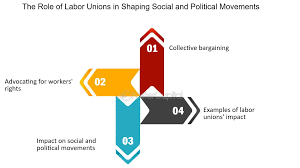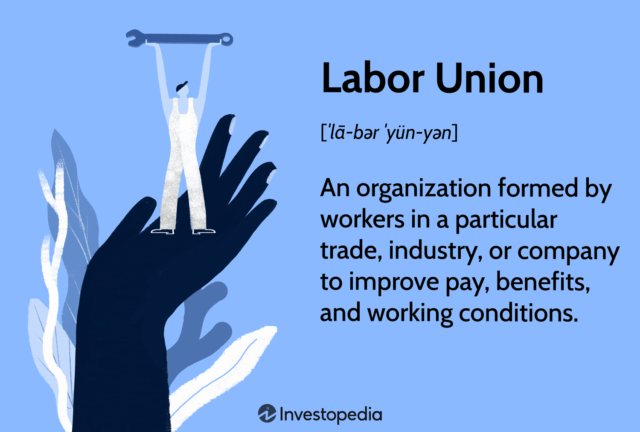The Role of Labor Unions in U.S. Politics
Labor unions have played a vital role in shaping U.S. politics for over a century. These organizations, made up of workers from various industries, strive to protect the rights and interests of employees. Through collective bargaining and political influence, labor unions aim to improve working conditions, wages, and benefits for their members. In this blog, we’ll explore how labor unions impact U.S. politics, their history, political strategies, challenges, and their current influence on government policies.
A Brief History of Labor Unions in the U.S.
Labor unions have been a significant force in the U.S. since the late 19th century. Workers in factories, railroads, and mines began organizing to push back against poor working conditions, long hours, and low pay. One of the earliest influential unions was the American Federation of Labor (AFL), formed in 1886. The AFL focused on securing better wages and safer working environments.
Over time, unions like the Congress of Industrial Organizations (CIO) and the United Auto Workers (UAW) emerged, representing workers in key industries like manufacturing and automotive production. These unions were not only concerned with labor issues but also political matters, such as fair labor laws and social programs.
Unions played a significant role in advocating for laws like the Fair Labor Standards Act of 1938, which established the minimum wage and overtime pay. By the mid-20th century, unions had grown powerful, with millions of members across the country. They became a crucial part of the political landscape, particularly with their support for the Democratic Party.
Labor Unions and Political Strategy
Labor unions use a variety of political strategies to influence government policy and legislation. One of their primary tools is lobbying. Union representatives meet with lawmakers to discuss labor issues and advocate for policies that benefit workers, such as raising the minimum wage or improving workplace safety regulations.
In addition to lobbying, unions participate in election campaigns. They endorse candidates who support labor-friendly policies and often contribute financially to their campaigns through Political Action Committees (PACs). Unions also mobilize their members to vote, ensuring that their voices are heard at the ballot box.
Another key strategy is collective bargaining. While this mainly affects negotiations between unions and employers, it can also impact political decisions. When unions win better contracts for workers, it can put pressure on lawmakers to pass laws that extend these benefits to all workers.
By staying active in both local and national politics, labor unions aim to create an environment where workers’ rights are protected and their concerns are addressed.
Challenges Facing Labor Unions in U.S. Politics
Despite their long history and political influence, labor unions face significant challenges in the U.S. today. One of the biggest obstacles is the decline in union membership. In the 1950s, about 35% of American workers were unionized. Today, that number is closer to 10%. This decline is partly due to changes in the economy, such as the shift from manufacturing to service industries, where unions are less common.
Another challenge is the rise of “right-to-work” laws in many states. These laws allow workers to opt out of joining a union or paying union dues, even if their workplace is unionized. Proponents argue that workers should have the freedom to choose whether to join a union, but opponents say that these laws weaken unions’ ability to negotiate on behalf of all workers.
Unions also face political opposition from some lawmakers and business groups who argue that unions increase labor costs and make it harder for businesses to compete. As a result, many efforts to pass pro-labor legislation, such as expanding collective bargaining rights or raising the federal minimum wage, face significant resistance.
The Role of Labor Unions in Shaping Policy

Despite the challenges, labor unions continue to play a critical role in shaping public policy in the U.S. Their advocacy has been instrumental in securing a range of worker protections, from workplace safety regulations to retirement benefits. Unions push for policies that benefit not just their members, but all workers.
One area where unions have had a significant impact is health care. Many unions advocate for expanded access to affordable health care and have been vocal supporters of policies like the Affordable Care Act (ACA). They argue that all workers deserve access to health insurance, not just those in unionized jobs.
Unions also play a role in education policy, particularly in advocating for better pay and working conditions for teachers. Teachers’ unions, such as the National Education Association (NEA), have been active in pushing for increased funding for public schools and opposing efforts to weaken teachers’ job protections.
In addition, unions advocate for policies that address income inequality, such as raising the minimum wage and ensuring that workers have access to paid leave and retirement benefits.
The Future of Labor Unions in U.S. Politics
Looking ahead, the future of labor unions in U.S. politics remains uncertain. While union membership has declined, there are signs of renewed interest in organized labor, particularly among younger workers and in industries that have traditionally been less unionized, such as technology and the gig economy.
Unions have also embraced new strategies to adapt to the changing workforce. For example, some unions are focusing on organizing workers in service industries, such as fast food and retail, where wages are often low and working conditions are poor. Others are exploring new models of worker representation, such as worker cooperatives and community-based organizing efforts.
In the political arena, unions continue to be a powerful force, particularly in elections. In the 2020 presidential election, labor unions played a key role in supporting candidates who promised to strengthen workers’ rights and expand access to health care and social services.
As the economy continues to evolve, labor unions will need to adapt to remain relevant. However, their long history and continued influence suggest that they will continue to play a vital role in U.S. politics for years to come.
Conclusion
Labor unions have been a cornerstone of U.S. politics for over a century. From securing better wages and working conditions for their members to shaping national policies on health care, education, and income inequality, unions have made a significant impact. While they face challenges such as declining membership and political opposition, their role in advocating for workers’ rights and influencing public policy remains strong. As new generations of workers become more politically engaged, unions will continue to evolve and shape the future of U.S. politics.










